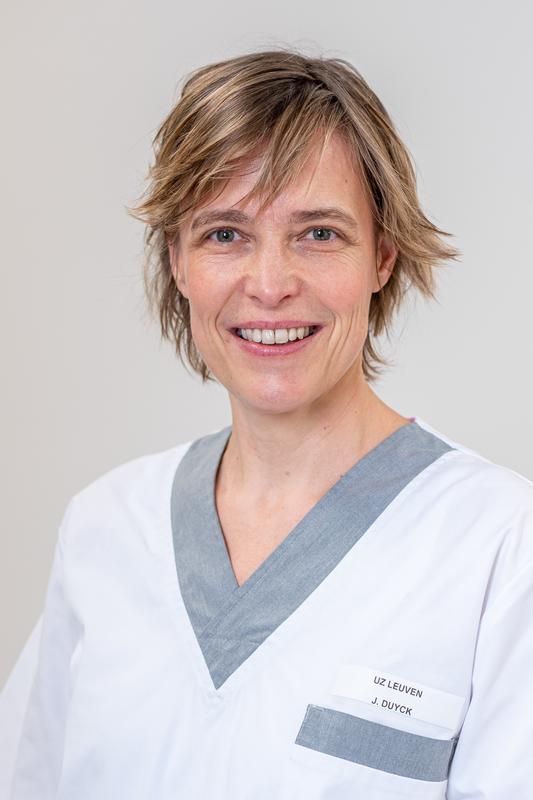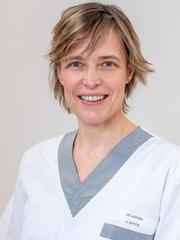In principle gerodontology or geriatric dentistry does not differ fundamentally from general dentistry. “In actual fact it is primary oral care but for a specific target group,” Professor Joke Duyck explained. “It is consequently not a separate discipline or specialist field in Belgium. We attach great importance to the interfacing of primary care with hospital care. Being a dentist in a university hospital we mainly try to promote awareness and adopt an advisory role. Dentists can also refer patients to us for treatments that should preferably be performed in a hospital or for difficult cases.”
More and more serious dental problems
Overall, older people tend to suffer from the same problems as younger people, but they are more frequent and usually more serious. “For example, they tend to lose teeth more frequently. One third of care-dependent older people have lost all their teeth. Cavities, gum disease and/or injured mucosa are also more common in the elderly. They often visit the dentist too late as a result of which the problem has reached a critical stage when it is being treated. There is a dire need for curative oral care in older people.”
Many older people depend on others for their day to day care. When this happens teeth are often not cleaned properly and a visit to the dentist becomes problematic.Professor Joke Duyck
Many older people depend on others for their day to day care. “When this happens teeth are often not cleaned properly and a visit to the dentist becomes problematic. Another important reason for dental problems is that older people often suffer from a dry mouth when taking certain medications, which reduces protection against, for example, cavities and other oral infections. Barely 15% of care-dependent older people are free from oral infections,” professor Duyck added.
Major consequences
Poor oral health has a major impact on quality of life and general health. People with bad teeth can no longer eat properly and tooth loss also has social consequences.
Moreover, it has an impact on general health. Professor Duyck: “People with a lot of plaque will more frequently suffer from pneumonia because they are breathing in bacteria all the time. There is also a proven link between dental problems and diabetes and heart and cardiovascular disease.”
Oral care line
Promoting awareness and prevention are crucial when trying to improve oral health in older people. Understanding the importance of a healthy mouth is a significant first step for both older people themselves and their care providers. Obviously you need to know how to maintain a healthy mouth. This can be achieved by, amongst other things, providing training for care providers.
'Gezonde Mond' takes initiatives to improve preventive oral care for vulnerable groups.
UZ Leuven/KU Leuven, UZ Gent/UGent and both Flemish professional organisations for dentists also cooperate within the Flemish Institute for Oral Health, referred to as Gezonde Mond (Healthy Mouth). “Gezonde Mond takes initiatives to improve preventive oral care for vulnerable groups. Care programmes have already been initiated for care-dependent elderly – the Mondzorglijn (Oral Care Line) – and disadvantaged – Ieders Mond Gezond (Healthy Mouth for All) people. A programme specifically for the disabled is also due to be launched,” Professor Duyck explained.
Mondzorglijn, the initiative for older people, focuses on adopting a structural approach to the introduction of preventive oral care policies in care organisations. “It is often difficult to know where to start with this type of policy in a residential care facility or hospital. It is important to first create a support base and establish what is feasible. In fact the actual guidelines of the policy are relatively straightforward: teeth and prostheses should be thoroughly cleaned, the mouth should be checked for oral inflammation and other oral problems to ensure that a referral can be made to the dentist in good time. It is vital that oral care should be considered an integral part of general care and included in the general care plan.”
Poor oral hygiene and tooth loss are not an inevitable consequence of ageing.Professor Joke Duyck
Care provider’s role
When someone becomes care-dependent and can no longer clean their teeth properly themselves, they need help. Unfortunately, oral care is often neglected, e.g. due to lack of time or because other health problems demand more attention. It is important that there should be a focus on daily oral care particularly with home care and in residential care facilities.
Care providers in hospitals should also give this aspect the necessary attention. “They can learn how to spot dental problems and initiate a referral. They can also be trained to determine whether patients are still able to manage their oral care themselves. If necessary they can adapt the oral care routine and ensure that it is continued when the patient goes home or back to the residential care home, with support if needed.”
Older people should also be made aware that it is possible to maintain a healthy mouth. Professor Duyck: “Poor oral hygiene and tooth loss are not an inevitable consequence of ageing. Older people should be able to rely on the fact that they can get help with their daily oral hygiene if necessary and that they can visit the dentist in good time. Because most dental and other oral problems can be prevented with a simple but thorough daily oral hygiene routine and regular visits to the dentist.”
Gezonde Mond
Gezonde Mond takes initiatives to improve preventive oral care for vulnerable groups. You can find more information on the website www.gezondemond.be.

